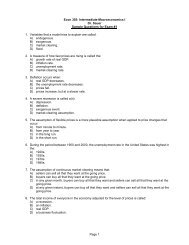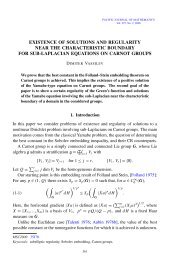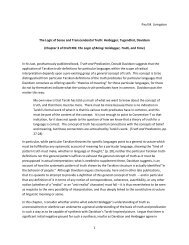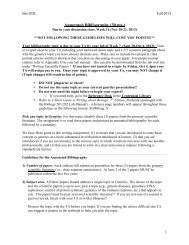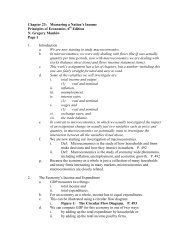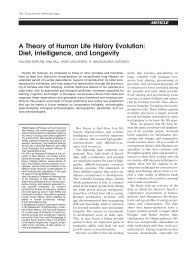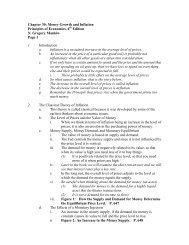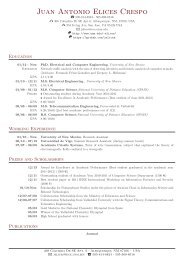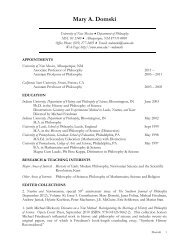Chapter 22: Frontiers of Microeconomics Principles of Economics, 6 ...
Chapter 22: Frontiers of Microeconomics Principles of Economics, 6 ...
Chapter 22: Frontiers of Microeconomics Principles of Economics, 6 ...
Create successful ePaper yourself
Turn your PDF publications into a flip-book with our unique Google optimized e-Paper software.
<strong>Chapter</strong> <strong>22</strong>: <strong>Frontiers</strong> <strong>of</strong> <strong>Microeconomics</strong><br />
<strong>Principles</strong> <strong>of</strong> <strong>Economics</strong>, 6 th Edition<br />
N. Gregory Mankiw<br />
Page 1<br />
1. Introduction<br />
a. Three topics are covered in this chapter<br />
i. asymmetric information,<br />
ii. political economy, and<br />
iii. behavioral economics.<br />
2. Asymmetric Information<br />
a. This is the most important section <strong>of</strong> this chapter.<br />
b. What is particularly important is how markets have adapted to adjust to the<br />
problems created by asymmetric information.<br />
c. A difference in access to relevant knowledge is called an information asymmetry.<br />
d. Hidden Actions: Principals, Agents, and Moral Hazard<br />
i. Moral hazard is a problem that arises when one person, called the agent, is<br />
performing some task on behalf <strong>of</strong> another person, called the principal.<br />
ii. Stated a different way: moral hazard is the tendency <strong>of</strong> people with<br />
insurance to do the activity against which they have insurance.<br />
iii. This <strong>of</strong>ten occurs with employment.<br />
(1) Employers can respond by:<br />
(a) Better monitoring,<br />
(b) High wages or<br />
(c) Delayed payments.<br />
iv. Def: Moral hazard is the tendency <strong>of</strong> a person who is imperfectly monitored<br />
to engage in dishonest or otherwise undesirable behavior. P 468<br />
v. Def: An agent is a person performing an act for another person, called the<br />
principal. P. 468<br />
vi. Def: A principal is person for whom another person, called the agent, is<br />
vii.<br />
performing some act. P. 468<br />
Some good examples <strong>of</strong> moral hazard occur with insurance.<br />
(1) Screening, deductibles, etc. can be important in controlling<br />
behavior.<br />
viii. FYI: Corporate Management, P. 469<br />
(1) An example <strong>of</strong> using incentives to minimize the principal-agent<br />
problem.<br />
e. Hidden Characteristics: Adverse Selection and the Lemons Problem<br />
i. Adverse selection is a problem that arises in markets where the seller knows<br />
more about the attributes <strong>of</strong> the good being sold than the buyer does.<br />
(1) Def: Adverse selection is the tendency for the mix <strong>of</strong> unobserved<br />
attributes to become undesirable from the standpoint <strong>of</strong> an<br />
uninformed party. P. 470<br />
(2) A classic example is used cars.<br />
(3) Another example is the use <strong>of</strong> efficient wages in labor markets.<br />
(4) Health insurance has major adverse selection problems.
<strong>Chapter</strong> <strong>22</strong>: <strong>Frontiers</strong> <strong>of</strong> <strong>Microeconomics</strong><br />
<strong>Principles</strong> <strong>of</strong> <strong>Economics</strong>, 6 th Edition<br />
N. Gregory Mankiw<br />
Page 2<br />
f. Signaling to Convey Private Information<br />
i. Def: Signaling is an action taken by an informed party to reveal private<br />
information to an uninformed party. P 471<br />
ii. To be an effective signal, it has to be costly.<br />
iii. Advertising is a good example since a company with a low quality product<br />
has little incentive to advertise because it will receive few repeat customers.<br />
iv. Education is full <strong>of</strong> examples.<br />
v. Case Study: Gifts as Signals, P. 471<br />
(1) People care most about the custom when the strength <strong>of</strong> the<br />
affection is most in question.<br />
(2) Men give gifts to girl friends, while parents give money to their<br />
children.<br />
a. Screening to Induce Information Revelation<br />
i. Def: Screening is an action taken by an uninformed party to induce an<br />
informed party to reveal information. P. 472<br />
ii. When an informed party takes actions to reveal his private information, the<br />
iii.<br />
phenomenon is called signaling.<br />
When an uninformed party takes action to induce the informed party to<br />
reveal private information, the phenomenon is called screening.<br />
(1) The use <strong>of</strong> deductibles.<br />
b. Asymmetric Information and Public Policy<br />
i. Private markets can sometimes deal with information asymmetries on their<br />
own through a combination <strong>of</strong> signaling and screening.<br />
ii.<br />
iii.<br />
Governments seldom have more information then the private parties.<br />
Governments are imperfect institutions.<br />
3. Political Economy<br />
a. The important thing to take away from this section is that politician and<br />
government employees are utility maximizers.<br />
b. Political economy is the study <strong>of</strong> government using the analytic methods <strong>of</strong><br />
economics. P. 473<br />
c. The Condorcet Voting Paradox<br />
i. Def: The Condorcet paradox is the failure <strong>of</strong> majority rule to produce<br />
transitive preferences for society. P. 474<br />
ii. Table 1: The Condorcet Paradox, P. 474<br />
d. Arrow’s Impossibility Theorem<br />
i. Def: Arrow’s impossibility theorem is a mathematical result showing that,<br />
under certain assumed conditions, there is no scheme for aggregating<br />
individual preferences into a valid set <strong>of</strong> social preferences. P. 475<br />
ii. In the News: Arrow’s Problem in Practice, P. 476<br />
e. The Median Voter is King<br />
i. Def: The median voter theorem is a mathematical result showing that if
<strong>Chapter</strong> <strong>22</strong>: <strong>Frontiers</strong> <strong>of</strong> <strong>Microeconomics</strong><br />
<strong>Principles</strong> <strong>of</strong> <strong>Economics</strong>, 6 th Edition<br />
N. Gregory Mankiw<br />
Page 3<br />
voters are choosing a point along a line and each voter wants the point<br />
closest to his most preferred point, then majority rule will prick the most<br />
preferred point <strong>of</strong> the median voter. P. 478<br />
ii. Figure 1: The Median Voter Theorem: An Example, P. 478<br />
f. Politicians Are People Too<br />
1. Behavioral <strong>Economics</strong> is the subfield <strong>of</strong> economics that integrates the insights <strong>of</strong><br />
psychology. P. 480<br />
a. People Aren’t Always Rational<br />
i. People can be forgetful, impulsive, confused, emotional, and shortsighted.<br />
ii.<br />
iii.<br />
iv.<br />
They may attempt to satisfy rather than maximize.<br />
People make systematic mistakes:<br />
(1) They can be overconfident.<br />
(2) People give too much weight to a small number <strong>of</strong> vivid<br />
observations.<br />
(3) People are reluctant to change their minds.<br />
The assumption <strong>of</strong> rationality, even it not exactly right, is still a good<br />
approximation.<br />
b. People Care About Fairness<br />
i. The ultimate game consists <strong>of</strong> two parties flipping a coin and then one<br />
divides the prize and the other decides whether they will accept the<br />
distribution.<br />
ii.<br />
iii.<br />
In the ultimate game, my sense is not so much fairness as spite.<br />
I am willing to incur a small cost to guarantee that you are not going to<br />
receive a large gain.<br />
c. People Are Inconsistent Over Time<br />
i. People do not maintain commitments.<br />
ii. In the News: Sin Taxes, P. 482<br />
2. Conclusion<br />
3. Summary



